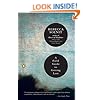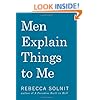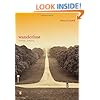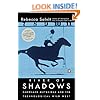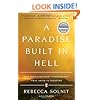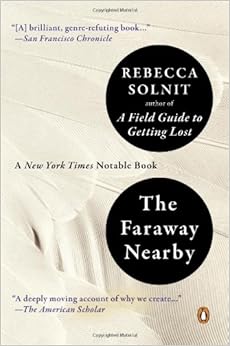
The Faraway Nearby
and over one million other books are available for Amazon Kindle. Learn more


Flip to back
Flip to front

The Faraway Nearby Paperback – April 29, 2014

$10.56
FREE Shipping on orders over $35.
Only 13 left in stock (more on the way).
Ships from and sold by Amazon.com.
Gift-wrap available.
NO_CONTENT_IN_FEATURE
Start reading The Faraway Nearby on your Kindle in under a minute.
Don't have a Kindle? Get your Kindle here, or download a FREE Kindle Reading App.
Don't have a Kindle? Get your Kindle here, or download a FREE Kindle Reading App.
Best Books of the Month
Want to know our Editors' picks for the best books of the month? Browse Best Books of the Month, featuring our favorite new books in more than a dozen categories.
Want to know our Editors' picks for the best books of the month? Browse Best Books of the Month, featuring our favorite new books in more than a dozen categories.
Product Details
Would you like to update product info or give feedback on images?.
|
Editorial Reviews
From Booklist
The catalyst for the latest spiraling inquiry by Lannan Literary Award–winning creative nonfiction master Solnit is her mother’s Alzheimer’s. Solnit considers memory and its mutations, contemplates the harvest of a backyard apricot tree, and celebrates the pleasures and revelations of reading and writing—“You have an intimacy with the far away and distance from the near at hand.” Drawing on intrepid research, she analyzes with verve and exceptional fluency in metaphor the pivotal roles stories play in our private and social lives, pondering the infinite resonance of fairy tales and Mary Shelley’s Frankenstein. Working with a sequence of repeating motifs—apricots, mirrors, ice, flight, breath, wound, knot—Solnit chronicles her residency in Iceland at the Library of Water and offers surprising and stirring observations about chemical pollution and polar bears, Dutch still lifes and Che Guevara, symbiosis and butterflies, the “mesmerizing art” of spinning and Buddhism, and her own alarming “medical adventure.” Solnit’s ensouling facility with language and profound perception of “physical and psychic geography” shape her complexly evocative musings on how we extract meaning from inheritance, feeling, place, and experience. --Donna Seaman
--This text refers to the
Hardcover
edition.
From Bookforum
Her most intimate work to date, The Faraway Nearby traces a difficult times in Solnit's life, as she endured her mother's descent into the fog of Alzheimer's, the death of a close friend, and her own struggle with breast cancer. Taking a cue from Buddhism, which "takes change as a given and suffering as the inevitable consequence of attachment and then asks what you are going to do about it," Solnit launches into an investigation of storytelling that helps her write her way toward something like solace.--Meehan Crist
--This text refers to the
Hardcover
edition.
More About the Author
Writer, historian, and activist Rebecca Solnit is the author of sixteen books about environment, landscape, community, art, politics, hope, and memory, including two atlases, of San Francisco in 2010 and New Orleans in 2013; this year's Men Explain Things to Me; last year's The Faraway Nearby; A Paradise Built in Hell: The Extraordinary Communities that Arise in Disaster; A Field Guide to Getting Lost; Wanderlust: A History of Walking; and River of Shadows, Eadweard Muybridge and the Technological Wild West (for which she received a Guggenheim, the National Book Critics Circle Award in criticism, and the Lannan Literary Award). A product of the California public education system from kindergarten to graduate school, she is a contributing editor to Harper's and frequent contributor to the political site Tomdispatch.com.
She encourages you to shop at Indiebound, your local independent bookstore, Powells.com, Barnes & Noble online and kind of has some large problems with how Amazon operates these days. Though she's glad if you're buying her books however.....
She encourages you to shop at Indiebound, your local independent bookstore, Powells.com, Barnes & Noble online and kind of has some large problems with how Amazon operates these days. Though she's glad if you're buying her books however.....
Customer Reviews
Most Helpful Customer Reviews
56 of 57 people found the following review helpful
By
Amelia Gremelspacher
TOP 500 REVIEWER on June 13, 2013
Format: Kindle Edition
Verified Purchase
Comment
Sending feedback...
The Huffington Press has chosen this lilting book as the book they are "talking about this week.". It will certainly haunt me. The story that launches her current book is the loss of her mother to Alzheimer's, step by awful step. In her attempt to frame this reality, she nests the narratives that her mother has told herself and her own responsive attempts to organize reality. Her mother had not been a warm, or often even kind.
With a deft hand, Solnit weaves the doors and windows through which she travels into a mesmerizing story. As a child, she was a solitary person, but found that " books are solitudes in which we meet." ( possibly my favorite sentence in the book.). She shares the stories that have helped her to shape her own life and have in turn inspired her own writings. She had decided early on to never refuse an adventure, and she shares a few she had taken as relief and growth as the burden of her mother grew.
Solnit also speaks of the ways in which our interior dialogues can trap us. They can tell us who to love or hate. "Not a few stories are sinking ships." She believes among these tales are the ones that stiffened and distanced her mother into jealousy and aloofness. Somehow, the author successfully weaves the story of Frankenstein and the history of his creator into a meaningful, and even necessary, part of her own discourse. Along the way, Solnit goes to the "country where many go much further and some don't return." She has been diagnosed with breast cancer.
This is a literate book for the reader who loves a well crafted work. It is thoughtful, insightful, and even funny. It challenges the reader to evaluate one's own internal script and to open for the constant change of every context. This is a book that fills the promise of solitudes meeting.
With a deft hand, Solnit weaves the doors and windows through which she travels into a mesmerizing story. As a child, she was a solitary person, but found that " books are solitudes in which we meet." ( possibly my favorite sentence in the book.). She shares the stories that have helped her to shape her own life and have in turn inspired her own writings. She had decided early on to never refuse an adventure, and she shares a few she had taken as relief and growth as the burden of her mother grew.
Solnit also speaks of the ways in which our interior dialogues can trap us. They can tell us who to love or hate. "Not a few stories are sinking ships." She believes among these tales are the ones that stiffened and distanced her mother into jealousy and aloofness. Somehow, the author successfully weaves the story of Frankenstein and the history of his creator into a meaningful, and even necessary, part of her own discourse. Along the way, Solnit goes to the "country where many go much further and some don't return." She has been diagnosed with breast cancer.
This is a literate book for the reader who loves a well crafted work. It is thoughtful, insightful, and even funny. It challenges the reader to evaluate one's own internal script and to open for the constant change of every context. This is a book that fills the promise of solitudes meeting.
Thank you for your feedback.
If this review is inappropriate, please let us know.
Sorry, we failed to record your vote. Please try again
33 of 35 people found the following review helpful
By
bas bleu
TOP 1000 REVIEWERVINE VOICE on June 16, 2013
Format: Kindle Edition
Verified Purchase
Comment
Sending feedback...
The Faraway Nearby, is the first work I have read by Rebecca Solnit. Far and away I am awestruck with her literary genius, and her genius in general. I did not agree with many of her views but that is neither here or there. Incomparable, is the only way to describe her incredible ability to put into word the abstract feelings and emotions written upon her psyche. Many of the feelings and emotions she shares are common to humankind, but few of us could come remotely close to putting these into acute focus with words, written or spoken.She shares that this book was written as an emergency, by the time you read that you will have already known that before she shares it in words. Dealing with her mothers disappearance into the mists of Alzheimer's, dealing with the trauma of surgery, possible breast cancer, the death of a dear friend, and the pain of a breakup with her boyfriend, wow, a walk on a thin line for any of us. I was left with the feeling that her emergency is still somewhat imminent. If so, may she find a light shining on the path that is to lead her to the steps of healing and metamorphosis to her higher self. A master of description, a rare gift of literary ability to her readers, Rebecca Solnit walks above the realm of the average gifted author.
Thank you for your feedback.
If this review is inappropriate, please let us know.
Sorry, we failed to record your vote. Please try again
18 of 18 people found the following review helpful
By
Bookreporter
on July 8, 2013
Format: Hardcover
Comment
Sending feedback...
If ever a word in the English language was more fraught with meaning, misunderstanding and creative potential than story, I'd like to know it. Perhaps love is a close contender, but as Rebecca Solnit's THE FARAWAY NEARBY demonstrates with such compelling and quiet power, story and love are so intertwined that they could be accused of conflict of interest.
Solnit challenges the very roots of what our society, specifically a Western capitalist-consumerist one, identifies in its limited way around the concept of stories and personal narrative. Writing fact-based (or even fact-motivated) autobiography or memoir is one thing; writing about reflected experiences that are allowed the elastic freedom of truthful change and evolution is quite another. The landscape of Solnit's memory is almost a genre unto itself, a vast expanse in which the universal and intimate literally travel side by side.
On one level, THE FARAWAY NEARBY recounts Solnit's arduous journey through her estranged mother's final years, as Alzheimer's disease progressively disconnected her cognitive abilities and self-awareness. It wasn't simply a matter of arranging an elderly woman's life and affairs as she transitioned from independence to nursing home care. It was also about rearranging and reframing a deeply entrenched story of mother-daughter contention that had persisted from Solnit's earliest childhood and infected an otherwise very successful adult career. When mother and child roles were reversed, a new intimacy and understanding emerged that came as close as anything to reconciliation.Read more ›
Solnit challenges the very roots of what our society, specifically a Western capitalist-consumerist one, identifies in its limited way around the concept of stories and personal narrative. Writing fact-based (or even fact-motivated) autobiography or memoir is one thing; writing about reflected experiences that are allowed the elastic freedom of truthful change and evolution is quite another. The landscape of Solnit's memory is almost a genre unto itself, a vast expanse in which the universal and intimate literally travel side by side.
On one level, THE FARAWAY NEARBY recounts Solnit's arduous journey through her estranged mother's final years, as Alzheimer's disease progressively disconnected her cognitive abilities and self-awareness. It wasn't simply a matter of arranging an elderly woman's life and affairs as she transitioned from independence to nursing home care. It was also about rearranging and reframing a deeply entrenched story of mother-daughter contention that had persisted from Solnit's earliest childhood and infected an otherwise very successful adult career. When mother and child roles were reversed, a new intimacy and understanding emerged that came as close as anything to reconciliation.Read more ›
Thank you for your feedback.
If this review is inappropriate, please let us know.
Sorry, we failed to record your vote. Please try again
18 of 19 people found the following review helpful
By
Stephen Persing
on June 24, 2013
Format: Hardcover
Verified Purchase
Comment
Sending feedback...
This book was billed in advance as similar to Solnit's book A Field Guide to Getting Lost, but that is misleading. This book touches on more pain, and the threads that run through it tie the book together more completely as a whole instead of a collection of essays. I liked both books, but The Faraway Nearby feels a little more mature in its acknowledgment of the sorrows and hardships of life. As always, Rebecca Solnit writes with inspired prose that seems always on the edge of becoming poetry. A marvelous book.
Thank you for your feedback.
If this review is inappropriate, please let us know.
Sorry, we failed to record your vote. Please try again
